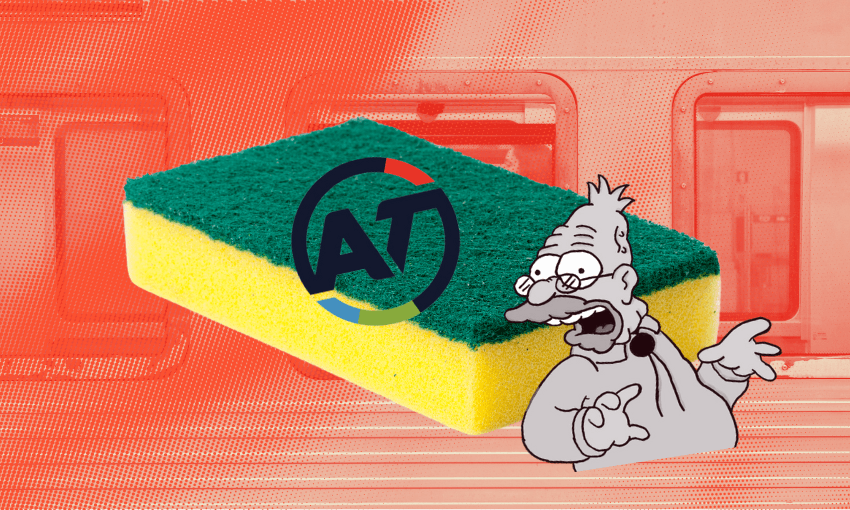A bill aimed at getting rid of AT might go before parliament. No one will miss AT more than the local politicians who use it as an easy blame sponge.
Auckland Transport staffers pretended to take notes as the councillor lectured them about buses. Their organisation had approved a plan to run public transport more frequently through her plush suburb, and she thought it would hurt businesses and ruin the vibe. “She told us ‘every 30 minutes at most should be sufficient’,” says one of the staffers in the line of fire.
That same councillor had voted for citywide increases in bus frequency. She’d joined a push to make a reluctant AT reallocate more road space away from cars toward public transport. Later that day, she turned up for the photo op cutting the ribbon on the new service. Once the cameras went away, she continued to criticise the buses to constituents and behind the scenes.
The councillor’s contradictory behaviour is in keeping with a lengthy tradition for our elected representatives. Auckland Transport hasn’t exactly helped itself when it comes to implementing progressive change. It spent years in a state of terrified paralysis after a local crank’s axe attack on a traffic island, and once successfully argued in court that it shouldn’t have to comply with the council’s own climate goals. But even in the moments it’s seemed ready to overcome its pathological aversion to building cycleways and bus lanes, it’s been hampered at every turn by councillors who vote for progressive actions and then vociferously oppose their implementation.
Auckland Transport has become the ultimate blame sponge for councillors who don’t want to pay the electoral cost of defending their own policies and positions. During his election campaign, mayor Wayne Brown consistently made the case for cheap, basic cycleways. But when one caused controversy on Upper Harbour Drive, he stood over it pulling a “WTF” face.
In office, Brown has made the case for lifting parking revenue and raising fines on people who park illegally. When AT’s efforts to follow through on those aims in the city centre caused a minor kerfuffle, he criticised its process, saying it was “a poor effort and I’m not happy about it”.
The mayor has also called for dynamic bus lanes to be rolled out across the city. He wants the power to make these changes quickly, arguing persuasively in an opinion piece for The Post that the consultation requirements foisted on councils by central government are burdensome, unfair, and a contributing factor in the chorus of complaints about local government red tape.
Imagine AT’s surprise then when it attempted to clear some parking for dynamic bus lanes on Karangahape Road, only to meet forceful criticism from the mayor over a lack of consultation.
Brown is hardly an outlier. Every councillor in the last local government term voted for Te Tāruke-ā-Tāwhiri, Auckland’s climate plan, which calls for massive cuts to carbon emissions, driven in large part by reducing driving, increasing public transport, walking, and cycling trips, and building dense housing in areas where those alternative transport options are most feasible.
Many of those same councillors voted to oppose building apartments and townhouses near train stations. They suffered a lengthy freakout over AT’s plans to potentially remove parking from 3.25% of the city’s road network over 10 years to make way for more buses. When the transport organisation proposed spending 1% of its budget on cycleways, they abstained on the vote.
In this context, AT has often struggled to choose which of the councillors’ competing instructions to prioritise. When it chooses to heed one directive, it will often receive criticism from the people who issued that directive for not listening to their simultaneous directive to do the opposite of what they called for, which has led to the organisation becoming terrified of doing anything at all.
Late last month, Marlborough-based NZ First MP Jamie Arbuckle introduced a members bill to disband AT and bring transport planning inside the council. Transport minister Simeon Brown has made sympathetic murmurings about the bill’s intention, as has his fellow mayoral Brown.
It might be a good idea. The current situation isn’t working that well. But no one will miss AT more than the politicians who complain about it the most. For so long, they’ve had the best of both worlds, voting for progress and not having to face the music when it causes disruption or upsets the NZ Herald. Even better, the organisation they criticise literally isn’t allowed to defend itself. When its chief executive attempted to gently push back on Brown over the city centre parking fiasco, it generated such an outpouring of political affront he almost got fired.
With that organisation gone, Auckland’s councillors might come under more pressure to face the consequences of their own decisions. Maybe they’ll find someone else to blame. Maybe they’ll still shirk responsibility as much as possible. This is politics after all. But at least sometimes they’ll have to make the difficult choice they’ve avoided for so long: have their cake, or eat it too.

